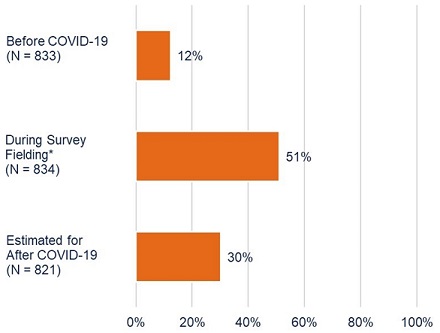Is It Time for Employers to Reimburse Remote Workers' Expenses?
Update policies with a view toward more home-based workers post-pandemic

As sizable numbers of workers continue to work from home due to the COVID-19 pandemic, it may be time for businesses that have not offered to reimburse remote employees' work-related expenses to consider doing so. These expenses can range from laptops and printers to routine office supplies, such as ink cartridges and paper.
"In the past, many employers offered reimbursement for traditional office supplies; however, with the ongoing pandemic, businesses are navigating new territory when it comes to expenses related to working from home," said Analisse Dunne, people operations manager at Nulab, a cloud-based compensation software firm.
Nulab's State of Remote Workers survey of more than 850 people working from home because of the pandemic found that most of these people—56 percent—were not allowed to bring equipment home from the office and that nearly 1 in 3 workers have had to purchase equipment to help with remote work. However, 37 percent of respondents were told they would not be reimbursed for expenses related to working remotely.
There is no federal requirement to provide reimbursement for remote expenses, except where those expenses would have the effect of lowering an employee’s wages to below minimum wage, although several states do require employers to pay for such expenses.
Regardless of legal obligations or the lack thereof, however, "providing support—whether through stipends or simply loaning equipment to remote workers—can improve company culture and further motivate workers," Dunne said.
The survey also showed that:
- Respondents spent an average of $194 on remote equipment.
- Workers who were not allowed to bring supplies and equipment home spent at least $35 more on these things than those allowed to bring them home.
- 52 percent of respondents want to continue working remotely once the COVID-19 pandemic passes.
Remote Work Expectations
Companies that haven't done so may benefit from revising their policies toward long-term remote workers, research suggests.
More workers will continue working from home on a permanent basis than before the COVID-19 pandemic, according to a July survey of 283 large employers conducted by consultancy Willis Towers Watson. The responding companies employ 4.4 million workers.
Employers expect that the proportion of their full-time employees who are working from home will level off at around 19 percent, which is less than half of early July 2020 levels (44 percent) but nearly three times what it was in 2019, before the pandemic (7 percent).
While employers expect to have significantly more remote workers in the future compared with last year, many have yet to develop policies to accommodate those working from home. The survey showed:
- Just 2 in 10 respondents have provided tools and resources to employees who may work remotely long term, although two-thirds plan to or are considering doing so.
- Only 1 in 10 have offered employees subsidies to manage the costs of working remotely, although nearly three times as many are considering doing so.
Employers will "need to continue to adapt to having a larger percentage of remote workers, and this will fundamentally change their culture," said Ravin Jesuthasan, managing director at Willis Towers Watson.
Reimbursing employees for work-from-home expenses, if employers haven't been doing so, is among the workplace policies employers may want to revisit.
"As we're seeing more companies delay their return to the office, it's more important than ever to ensure that workers have the equipment and resources they need to get their job done," Dunne said .
Mark Stevenson of Smart HR, an Alexandria, Va.-based consulting firm, said some of his clients are covering 50 percent of staff members' home Internet access and a portion of their cellphone services. Others are not reimbursing for those fees and are encouraging employees to see it as a trade-off for saved commuting expenses, SHRM Online previously reported.
[SHRM members-only HR Q&A: Are we required to reimburse work-related expenses for employees who work from home?]
Improving Remote Work
There are signs employers are adjusting to the new normal of remote work. As more companies announce plans to expand or extend remote working arrangements for employees, they are providing new tools and programs to improve the productivity and well-being of their remote workforce, according to a global survey of 2,004 HR leaders by business consultancy Aon. The survey, conducted Aug. 17 to Aug. 25, showed that:
- 71 percent of respondents' companies are actively investing in tools and technologies to support remote collaboration.
- 42 percent have already enhanced, or are actively considering enhancing, allowances and reimbursement policies for remote employees in response to the pandemic. This includes covering cellphone, Internet and home office expenses.
The findings demonstrate that more companies "are actively preparing for the future of work" by focusing on improving workforce agility and making remote work effective, said Michael Burke, chief executive officer for Aon's human capital business.
A Sample Policy The Society for Human Resource Management's sample telecommuting policy and procedure template provides for companies on a case-by-case basis to:
Under the sample policy, employers are not responsible for costs associated with the setup of an employee's home office, such as remodeling, furniture or lighting, nor for repairs or modifications to the home office space. |
Remote Worker Becomes Permanent
The average percentage of employees who will work remotely at least part of the time is projected to nearly triple from 12 percent before the COVID-19 pandemic to 30 percent after the pandemic, according to new survey results.
An average of 51 percent of employees were working remotely this summer, indicating that while remote working arrangements will be less common in the post-COVID environment than during the pandemic, they will remain elevated over pre-pandemic levels.
The Survey on Employer Response to COVID-19 by Brightmine™ HR & Compliance Centre, a provider of HR information resources, was conducted from late July to mid-August 2020, with responses from 835 U.S. employers that together employ more than 1 million workers.
"It is clear that COVID-19 will shape the working world for years to come, in particular contributing to a rise in remote work set to last beyond the end of the current health crisis," said Andrew Hellwege, Brightmine surveys editor.
Average Percentage of Workforce That Is Remote at Least Part Time

Source: Brightmine 's Survey of Employer Responses to COVID-19, conducted from July 28, 2020, to Aug. 14, 2020.
Related SHRM Articles:
Ask HR: Can I Expense My Telecommuting Purchases?, SHRM Online, October 2020
When—and How—to Negotiate Benefits with Workers and Job Seekers, SHRM Online, September 2020
Despite Reopenings, Many Employees Will Work Remotely into 2021 and Beyond, SHRM Online, August 2020
Rethinking Expenses as Remote Work Continues Through the Summer, SHRM Online, May 2020
An organization run by AI is not a futuristic concept. Such technology is already a part of many workplaces and will continue to shape the labor market and HR. Here's how employers and employees can successfully manage generative AI and other AI-powered systems.



